Christof Lehmann (nsnbc) : Nechirvan Barzani, prime Minister of Iraq’s Kurdistan Autonomous Region (KAR) has met with Iraqi federal prime Minister Haider Al-Abadi in the Iraqi federal capital Baghdad on Saturday before he is scheduled to meet with Iranian officials including Iranian President Hassan Rouhani. Iran is in the process of establishing a military foothold on the prime Iraqi real estate in the predominantly Yazidi Mount Shingal.
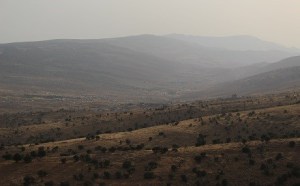 The office of Iraqi federal Prime Minister Haider al-Abadi issued a statement stressing that “International borders must be under the Federal Authority since it is within the exclusive powers of the Federal Authority.” The federal government insists on its border control monopoly among others, because it wants to see to that oil produced in the Kurdistan Autonomous Region (KAR) be “handed over” to the federal government so that it will be exported through the Iraqi oil marketing company SOMO, explained the federal Prime Minister’s office.
The office of Iraqi federal Prime Minister Haider al-Abadi issued a statement stressing that “International borders must be under the Federal Authority since it is within the exclusive powers of the Federal Authority.” The federal government insists on its border control monopoly among others, because it wants to see to that oil produced in the Kurdistan Autonomous Region (KAR) be “handed over” to the federal government so that it will be exported through the Iraqi oil marketing company SOMO, explained the federal Prime Minister’s office.
Baghdad also stated that it recognizes fully, the borders of the Kurdistan Autonomous Region, meaning that it respects the rule of the Kurdistan Regional Government (KRG) in all areas that were under KRG control before 2003. However, there are disputed areas, among others in Kirkuk, where the KRG in 2017 held an independence referendum and according to figures presented by the KAR’s High Election and Referendum Commission achieved a majority of votes in favor for Kurdish independence and by implication, a majority for adding Kirkuk and other regions to Kurdistan. The dispute nearly led to an armed conflict between the federal government and the KRG in late 2017 following the independence referendum in September.
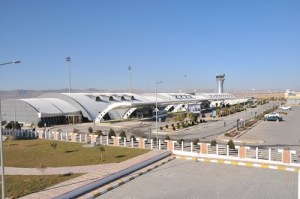 Al-Abadi reiterated the “position of the [Iraqi federal] government that it is necessary to commit to the borders of the [Kurdistan] Region as stipulated by the constitution,” according to the Iraqi statement. He also stressed on the “unity and sovereignty of Iraq”, that the committees for technical talks over the issues of the Kurdish airports and payment of salaries must continue between the two sides. The federal prime minister ordered the committees to continue their work including those tasked with “reopening the airports,” after completing all procedures that would allow the “return” of Federal Authority to the airports of Erbil and Sulaimani.
Al-Abadi reiterated the “position of the [Iraqi federal] government that it is necessary to commit to the borders of the [Kurdistan] Region as stipulated by the constitution,” according to the Iraqi statement. He also stressed on the “unity and sovereignty of Iraq”, that the committees for technical talks over the issues of the Kurdish airports and payment of salaries must continue between the two sides. The federal prime minister ordered the committees to continue their work including those tasked with “reopening the airports,” after completing all procedures that would allow the “return” of Federal Authority to the airports of Erbil and Sulaimani.
The two sides discussed the latest political and security development including solving their outstanding issues, the statement added. The KRG has not issued a statement yet regarding the meeting yet. It is the first meeting between the two leaders since the Kurdish referendum was held in September, opposed by Baghdad and neighboring countries.
KAR Prime Minister Nechirvan Barzani headed a Kurdish delegation to the Iraqi capital, accompanied by his deputy Qubad Talabani and chief of staff to the Kurdish presidency Fuad Hussein. The visit comes in the backdrop of months of international pressure to jumpstart “political dialogue” by countries including France, Germany, the United Kingdom and the United States, all members of the US-led anti-ISIS global coalition. The two sides have already started “technical talks,” regarding disagreement over the KRG’s share of the Iraqi budget, oil, airports and border entries.
A senior Iraqi delegation visiting Erbil earlier this week agreed to present a list of recommendations to the Iraqi government for approval. It included a proposal aimed to end an ongoing Iraqi-imposed flight ban on international flights to and from the Kurdistan Region as part of a series of punitive measures against the Kurdish vote that saw about 93 percent of the people of Kurdistan choosing to leave Iraq. The new arrangement commits the Kurdish government to put the airports under the federal authority regulations and oversight, something Erbil argues has always been the case since the invasion of Iraq in 2003.
The delegations also discussed an oil-for-budget proposal, pending the approval of PM Abadi that will allow the KRG to receive its share of the budget in return for allowing the Iraqi government to export and sell oil produced by the Kurdish government. On Tuesday Al-Abadi said the talks between the two sides had reached a “high level” of satisfaction, while vowing to resolve all outstanding issues with Erbil, some of which he said are a century old. PM Barzani made similar remarks later in the week.
Kurdistan’s PM Barzani is expected to visit the Iranian capital Tehran later today where he is expected to meet with Iranian officials, according to Iranian and Kurdish officials. Iran opposed the Kurdish independence referendum in September closed its borders with the Kurdistan Region for months, and helped Baghdad to bring the majority of disputed areas under its control following deadly clashes such as the oil-rich Kirkuk, dealing a blow to the KRG revenues that has since slashed by half, a move that further worsened the Kurdish financial crisis that began since early 2014 mainly because of the budget cut by Iraq at that time. Several high-ranking Iranian officials even want as far as to threaten military action should the region declare independence.
Is Tehran eyeballing prime military real estate in Iraq’s predominantly Yazidi Mount Shingal?
The presence of Iranian commander Ali Qakarani accompanied by Iranian forces including some 30 or more bodyguards in the Yazidi town of Sinjar, northwest Iraq in November, strongly suggested that Tehran has set its sights on Saddam’s former prime real estate for Scud missiles. The presence of Iranian troops or proxies has immediate consequences for the Yazidi, but the prospect of the placement of Iranian missiles on the Mount will have regional implications that put the Yazidi and the Kurds between a rock and a hard place.
Iranian Commander Ali Qarkarani spotted in Sinjar
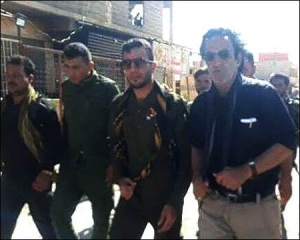
Iranian commander Ali Qakarani (right) in civilian clothes accompanied by Iranian forces including some 30 or more bodyguards on October 18, 2017 in the Yazidi town of Sinjar, northwest Iraq.
Kurdish officials Ali Qarkarani in civilian clothes accompanied by Iranian forces including some 30 or more bodyguards on October 18, 2017 in the Yazidi town of Sinjar, northwest Iraq.
Qarkarani and his delegation visited the strategically extremely sensitive region after the independence referendum in Iraq’s Kurdistan Autonomous Region (KAR) and as forces of the Iraqi, Shia-dominated military and Iranian-backed Popular Mobilization Forces (PMU) a.k.a. al Hashd al-Shaabi gained control of Kirkuk and other strategic areas, disputed claimed by both Baghdad and the Kurdistan Autonomous Region.
The visit of Ali Qarkarani and the Iranian delegation came also against the backdrop of significant progress made by the predominantly Syrian – Kurdish, U.S.-backed Syrian Democratic Forces (SDF) in northeastern Syria and especially, in Raqqa and Syria’s Deir Ez-Zor province. The presence of the Iranian delegation including Alo Qakarani in Sinjar and on Mount Shingal strongly suggests that Iran has set its sights on controlling the predominantly Yazidi region.
The presence of the Iranian commander also suggests that Iraq’s Yazidi (Yezidi) on Mount Shingal and in Sinjar have good reason to be concerned about continued oppression, now by Shiite militia instead of ISIS, and that Yazidi fighters who returned from Raqqa may not have the opportunity to enjoy peace for a very long time.
Shingal Women’s Units (YJS) returned from Raqqa in October
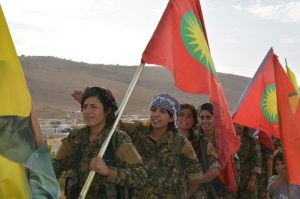 In late October, only days after Qarkarani and the Iranian delegation was spotted in Sinjar, fighters of the Shingal Women’s Units (YJS) who took part in the operation to liberate Raqqa, have returned home after four months of battle against Daesh gangs.
In late October, only days after Qarkarani and the Iranian delegation was spotted in Sinjar, fighters of the Shingal Women’s Units (YJS) who took part in the operation to liberate Raqqa, have returned home after four months of battle against Daesh gangs.
The returning female fighters from Shingal (Shengal) located in the Sinjar montains in Iraq near the Syrian border, who took part in the operation against the Islamic State in Raqqa, as party to theU.S.-backed Syrian Democratic Forces (SDF) were welcome home with enthusiasm.
Fighters speaking to their community stated “for Êzidî women, we took revenge from Daesh”. The people of Shengal welcomed their fighters at the Serdest Camp on the foothills of Mount Shengal.
L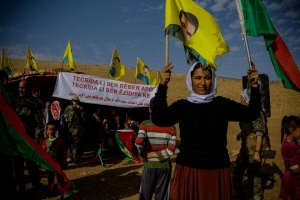 ater on, the people and the fighters drew attention to the health conditions of Kurdish People’s Leader Abdullah Öcalan by chanting slogans as they walked to a tent that was built up for this purpose. One of the YJŞ fighters named Tekoşin shared her feelings with us in front of the camera as such:
ater on, the people and the fighters drew attention to the health conditions of Kurdish People’s Leader Abdullah Öcalan by chanting slogans as they walked to a tent that was built up for this purpose. One of the YJŞ fighters named Tekoşin shared her feelings with us in front of the camera as such:
“Turning back to Shengal after four months of battle fills us with joy. The people welcomed us with huge enthusiasm at a tent dedicated to the Leader. And we dedicate the victory of Raqqa first of all to our leader, to our martyrs and the Êzidî women that were taken as hostages by Daesh.”
YJS commander Dersim Baran stated that they fulfilled their duty in Raqqa and that they handed over the rescued hostages to the SDF. With their camp based at Mount Shingal and at the Iraqi – Syrian boder, however, the YJS may not have much time to enjoy peace.
The Yazidi’s uncertain future between a rock and a hard place
In September 2017 YAZDA released a report entitled “AN UNCERTAIN FUTURE FOR YAZIDIS: A REPORT MARKING THREE YEARS OF AN ONGOING GENOCIDE“. The report also stressed the potential for conflict with Yazidi being caught in the middle of conflicting interests stating:
The PMU (Popular Mobilization Units a.k.a. Hash al-Shaabi) is the second most influential force in Sinjar and the principal political presence in southern Sinjar. The PMU controls a swathe of land along the Iraq-Syria border and most of Nineveh Province. The two most prominent groups of the PMU in Sinjar are Kata’ib al-Imam Ali (the Imam Ali Battalions) and the Badar Organization. The PMU is said to be under the authority of Deputy Commander, Mahdi al Muhandis. Its presence has drawn further Turkish interests into Sinjar and created a potentially combustible situation with the PDK, as the latter reportedly perceives PMU as its ‘next generation’ enemy.
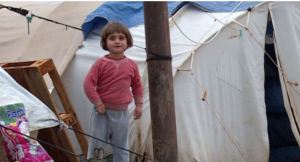 However, Yazidi are also aiming to assert themselves within the Hashd al-Shaabi. The report notes among others that:
However, Yazidi are also aiming to assert themselves within the Hashd al-Shaabi. The report notes among others that:
The PMU in Sinjar comprises mostly Shi’a fighters from different brigades. However, a new Yazidi force is being established and is currently made up of approximately 2,000 Yazidi fighters under three organized battalions – Kocho, Lalish, and Ezidkhan. These are likely to increase in size in the coming months. A training base has been established in southern Sinjar to train Yazidi fighters in the battalions.
Two Yazidi commanders, Murad Shero and Naif Jaso, are the highest-ranking Yazidi leaders within the PMU. Other tribal leaders have also joined. Both the Yazidi Movement for Reform and Progress and the Yazidi Progress Party are supporting the CGI, the presence of the PMU forces and the Iraqi Military in Sinjar, but they oppose all Kurdish politics in Sinjar and all Yazidi areas. Some civil and independent groups as well as NGOs hold a similar position.
The report also noted that the PMU, at least according to its public statements, appears to conform with Yazidi objectives for the population in Sinjar. It has promised Yezidi self-rule for their areas; the formation of a force under Yazidi leadership; and the bringing to justice of all those who participated in the genocide.
However, now that the Central Government of Iraq, with the help of Iranian – backed Shiite Hashd al-Shaabi, has pushed Kurdish Peshmerga out of Shingal again, it remains to be seen whether the Hashd (and by implication Tehran) will honor their promises, if the Central Government in Baghdad will honor its promises, or if Baghdad reverts to is culture and policy of oppression.
Finally, there is a risk of Yazidi infighting as different armed Yezidi organizations have different affiliations, some of them being allied with the PKK and YPG, others with other Iraqi Kurdish parties and groups, and yet others again with the Hashd or the central government.
The YJS is solidly anchored in its alliance with the Kurdistan Worker’s Party (PKK), putting it at odds with Turkey, Iran, the Shia-dominated government in Bagdad, the Syrian Baath Party government in Damascus, as well as those Yazidi militia that joined the Hashd al-Shaabi.
Yazidi communities are, in other words, caught in the middle of regional and geopolitical rivalries involving the Central Government of Iraq, the Shiite government in Iraq, the uncompromisingly anti-Kurdish and increasingly Islamist Sunni Turkey, various – including rivaling – Kurdish groups from Iraq, Iran, Syria, and Turkey, an increasingly Iranian-dominated Syria, as well as the UK, other EU member States, the USA and Russia.
The potential for a genocide and even an intra-Yazidi conflict is not only present; It constitutes an acute risk. Khairi Bozani, the head of the Yazidi Affairs Office of the Kurdistan Regional Government (KRG) in Iraq’s Kurdistan Autonomous Region (KRG) said in November 2017 the number of Yazidi survivors who were kidnapped by the Islamic State has reached up to 3,191. Bozani said around 90,000 Yazidi out of a total of 550,000 in Iraq have immigrated to Europe.
Presence of Iranian troops or proxies on Mount Shingal bound to have regional implications
Iran’s apparent attempt to control Mount Shingal and the consequences of this attempt have far-reaching implications that put the Yazidi in the center of a potentially perfect storm. Mount Shingal was Saddam Hussein’s prime rea estate for Scud missile launches.
Any presence of Iranian troops or proxies with access to ballistic missiles on Mount Shingal or with the capability to move ballistic missiles there on short notice will invariably attract Israel’s and arguably also Washington’s undivided attention and put the Yazidi and Kurds between a rock and a hard place.
Kurds in Syria and Iraq, Turkey and Iran are aware of Mount Shingal’s strategic importance, including the fact that the placement of long-range artillery or short-to-medium-range missiles on Mount Shingal would give Tehran or its proxies great advantages with regard to controlling “rebellious Kurds” in Iraq’s Kurdistan Autonomous Region (KAR), including Iranian Kurds on the Iraq – Iran border, U.S.-backed Kurds in eastern Syria, and PKK and PKK allied Kurds on the Iraqi – Turkish border.
It is worth noting that the “absolute control” over Iraq’s borders as proposed by the pro-Iranian al-Abadi also would imply “absolute control over intra-Kurdish borders” on Iraqi territory and the probable attempt to make it more difficult for Turkish, Iraqi, Iranian and Syrian Kurdish military forces to coordinate and cooperate.
Syria, depending on Iran, is likely to find a consensus with Iraq, Iran, and even with Turkey, against those “rebellious Kurds” and the Yazidi are caught in the middle of an increasingly likely perfect storm. Turkey is bound to back Iranian policies, putting it even more at odds with Washington and the EU.
Prior to the Atlantic Council’s 2013 Summit in Ankara, Council President Frederik Kempe was quoted as saying that he is of the opinion, that a very important period has begun from the perspective of the United States, Turkey and Iran, saying: “We view the current period as a turning point, just like 1918 and 1945. Turkey is in every way a central country, as a creator of regional stability. However much the USA and Turkey can work in unison, that is how effective they will be.”
The implied takeaway message is that the arbitrarily drawn borders of the Middle East, imposed during the Ottoman period, the colonial period, Sykes – Picot, and post World War II have led to disaster and misery. A reorganization and a restructuring of the region – also one that breaks up artificially-constructed nation states – the creation of new constructs based on the sovereignty of people and their right to self-determination in the region could become the challenge of this century. One of the great questions will be “did we learn from the catastrophic wars that ended in 1918 and 1945 – and how will it be possible to achieve self-determination for Kurds, an end of the seemingly endless persecution and oppression of Yazidi and other people in the region without repeating catastrophic mistakes”.
CH/L – nsnbc 20.01.2018
Source Article from https://nsnbc.me/2018/01/20/kurdistan-iraq-and-irans-interest-in-saddams-prime-real-estate-for-scud-missile-launches/
 RSS Feed
RSS Feed















 January 21st, 2018
January 21st, 2018  Awake Goy
Awake Goy 










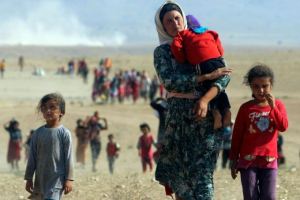
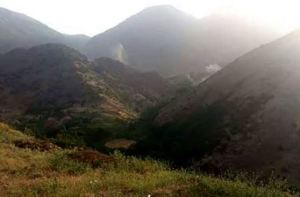

 Posted in
Posted in  Tags:
Tags: 













